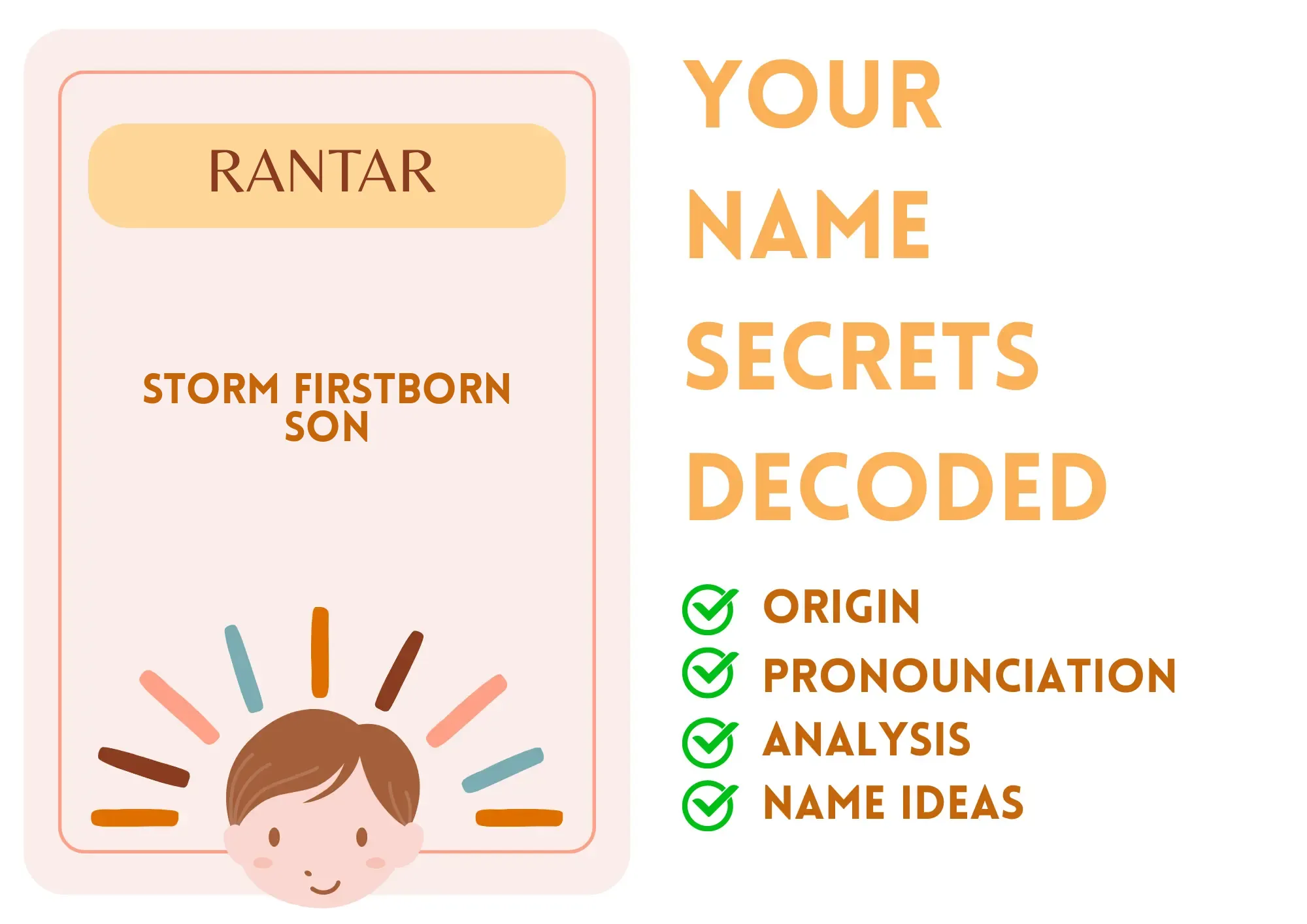
Rantarō
Rantarō is a unique and evocative name of Japanese origin, composed of two kanji characters: 嵐 (ran) meaning 'storm' and 太郎 (tarō) which is a common male suffix signifying 'firstborn son'. The name evokes a sense of strength, resilience, and powerful individuality, suggesting someone who faces challenges head-on, much like a storm.
While uncommon outside of Japan, Rantarō is appreciated for its distinct character and cultural significance. Its pronunciation is straightforward, although the 'ō' at the end may require some attention. Nicknames like 'Ran' or 'Tarō' could be used.
Though not widely known, Rantarō could be an excellent choice for parents seeking a name with a strong, distinctive personality. It evokes images of natural power and unwavering determination.
Basic Information
Gender: Boy
Sounds Like: Rahn-tah-roh
Pronunciation Explanation: The emphasis is on the second syllable, 'tah', and the 'ō' at the end is pronounced like the 'o' in 'go'.
Summary and Meaning
Meaning: Storm Firstborn Son
Origin: The name Rantarō is of Japanese origin, derived from the kanji characters 嵐 (ran) and 太郎 (tarō).
Usage: Rantarō is exclusively a masculine name in Japanese culture.
Name Number (Chaldean)
Name Number (Pythagorean)
Popularity (Global Rank)
Overall: 1327923
Boys:
Most Popular in
Religious and Cultural Significance
Religion: Shinto, Buddhism
Background: The name Rantarō holds significance in Japanese culture, where storms are often seen as powerful forces of nature. It could be associated with the Shinto belief in nature spirits (kami) and the Buddhist concept of impermanence.
Cultural Significance: The 'Tarō' suffix is common in Japanese names, indicating the firstborn son. Rantarō, therefore, suggests a strong, independent individual, capable of navigating life's challenges.
Historical Significance:
Popular Culture
Literature and Mythology: The name Rantarō could be found in Japanese literature, particularly in stories involving storms or strong, independent characters.
Movies and Television: Rantarō may appear as a character name in Japanese films and TV shows, often portraying characters with strong personalities and unwavering determination.
Feelings and Perceptions
Perception: Rantarō is generally perceived as a strong, unique, and evocative name. It carries a sense of power, resilience, and individuality. It may be unfamiliar to people outside of Japanese culture.
Positive Feelings: Strong, powerful, unique, independent, determined, resilient, adventurous, natural, cultural significance.
Negative Feelings: May be unfamiliar to many, pronunciation might require clarification, could be perceived as too strong or imposing for some.
Practical Considerations
Ease of Writing and Calling:
Common Typos and Misspellings: Rantaro,Rantarou,Rantauro,Rantaroh
Common Nicknames: Ran,Tarō,Ranta
Rantarō Popularity
Rantarō Usage and Popularity By Country
| Country | Rank (Overall) |
|---|
Rantarō Usage and Popularity By City
| City | Rank (Overall) |
|---|
Compatibility Analysis
Success Mantra for Rantarō
Rise up to the challenge.
Aspire to be your best.
Never settle for less.
Train your mind and heart.
Aim for the stars.
Reach for your dreams.
Overcome every obstacle.
Alphabet Analysis for Rantarō
Radiant
Adventurous
Noble
Talented
Amusing
Remarkable
Outstanding
Acrostic Poetry for Rantarō
Rambunctious laughter, fills the air
Adventurous spirit, without a care
Notoriously late, but still a delight
The joker of hearts, making wrongs right
Amusingly clumsy, trips on the floor
Ready to dance, who could ask for more?
Oblivious charm, like a puppy's face
Ultimately fun, a true friend in any case!
A Fun Roast for Rantarō
Riding high on borrowed hype,
A joke that’s stale, a meme unripe,
Not a hero, but a wannabe,
Treading water in mediocrity,
Always acting like you’re bold,
Ragged tales that never get old,
Oblivious to the laughter, the scorn,
A Love Poem for Rantarō
Radiant you are, like the dawn’s soft embrace,
A melody sweet, setting the world to pace.
Nights filled with laughter, our kisses like wine,
Tenderly weaving our destinies, entwine.
All of my dreams in your eyes I can see,
Reviving the whispers of what’s meant to be,
Open and honest, our love knows no bounds.
Famous Persons Named Rantarō
Related Names
Similar Sounding Names:
Rintaro,Kentarō,Shintarō,Taro